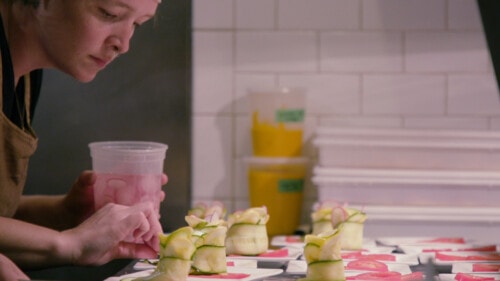Food Bank Leases Restaurant to Provide Fresh Eats for Kansans in Need Lawrence-Based Just Food Creates New Model for Fighting Food Insecurity
Published March 7th, 2024 at 6:00 AM
Above image credit: Lawrence food bank Just Food is using shared restaurant space to operate Chop Shop, an effort to connect food that could otherwise end up in a landfill with hungry people in need. (Dominick Williams | Flatland)Nearly a year after the COVID-19 public health emergency declaration ended on May 11, 2023, a pandemic-fueled boom in demand for food bank support has not abated.
Just ask the folks at Lawrence-based food bank Just Food.
“Previous to the pandemic, our pantry was serving anywhere from probably 80 households a day up to about 200 households,” says Just Food Impact Director Jessica Cooney. “I remember the first day that we hit 200 households in a day was some point in mid-2019, and it was huge for us.
“Now, our peak is 500-plus households a day when it’s a holiday or just really, really busy days,” Cooney says, adding that an average day is “anywhere from about 350 to 450 households.”
Mounting concern about food security persists even as the United States continues to waste an enormous amount of fresh food.
The U.S. Department of Agriculture (USDA) estimates that Americans waste approximately 30-40% of the country’s food supply. Leading food bank network operator Feeding America pegs the numbers at 160 billion pounds, worth about $444 billion.
While whole, raw foods are welcome at food pantries, folks who frequent those pantries are also eager to access ready-to-eat items like sandwiches, pasta dishes and main course meats. In the runup to the pandemic, Just Food had been able to offer these items thanks to partnerships with local grocery retailers. But as with much else, the pandemic upended this arrangement.
It’s a classic example of the supply chain disruptions that rippled through the economy during the pandemic. Only this one affected hungry people, and those who are trying to help them.
“We got a lot of meals from grocery stores, and those donations were going down,” Cooney says. “Our donation numbers were going down and our numbers served were going up.”
The data paints a stark picture.
Cooney says Just Food had 40,007 individual visits to its pantry in 2021, up from 31,013 in 2020. In 2022, that number ballooned to 57,878 individual visits — an almost 31% increase. The trend did not reverse in 2023, when the pantry counted 54,762 visits.
The search for a solution led to the creation of the Chop Shop, Just Food’s new ready-to-eat prep kitchen. Chop Shop helps connect donated, fresh food — perfectly good food that might otherwise end up in a landfill — with people in need. It just might offer a model for addressing food insecurity that could be replicated nationwide.
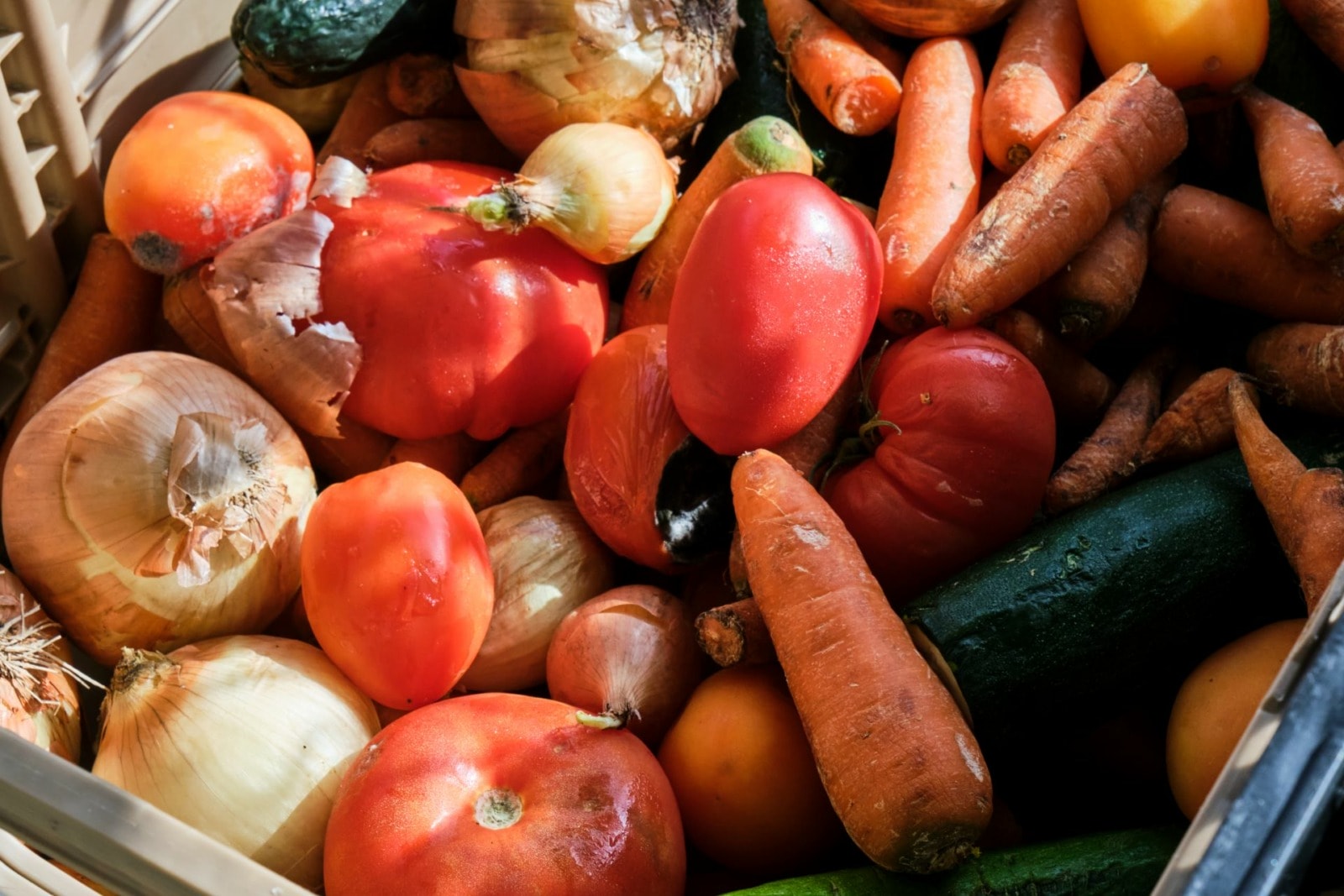
What Do You Do with a Rutabaga?
“Some of the ingredients I use are sort of intimidating for people that don’t know how to cook,” says Chetan Michie, Just Food’s first-ever production and sourcing manager. “Like a rutabaga, for instance. What the heck do you do with a rutabaga?”
Michie knows what to do with a rutabaga.
With 19 years of culinary experience at places like Lawrence’s 715 and Latchkey Deli — and with butchering, curing and smoking experience to boot — Michie is a big part of the energy behind Chop Shop.
Michie, Cooney and others at Just Food saw the writing on the metaphorical menu. There was real demand for prepared foods, but the supply was dwindling. And, as noted above, the U.S. has a huge food waste problem. So, they rolled up their sleeves and opened the kitchen they and their patrons needed.
“A lot of folks, especially with working 50 or 60 hours a week right now, just trying to make ends meet — time is scarce to cook food as well,” Michie says. “Also, we serve a lot of seniors that may not have the ability to cook for themselves, or people with disabilities where they can’t cook for themselves. And so those ready-to-eat foods are a top commodity.”
Just Food can receive some awkward items that, in the past, may have been hard to distribute. Consider #10 cans of spaghetti sauce. At 109 ounces, these giants rarely appear on grocery store shelves. Michie says it’s possible that Just Food could receive an entire pallet of #10 cans.
“If we were to just put out #10 cans of spaghetti sauce,” he says, “even a family of four would probably get sick of eating spaghetti that much before this stuff sort of goes bad.”
Now, Just Food can break these large donations down, packaging them in containers more appropriate for individuals and families, thus helping folks in need and diverting food from the waste stream.
Stability Breeds Efficiency
If you don’t have to load in and load out your entire kitchen, it turns out you can make a lot of food.
Prior to the Chop Shop, Michie says Just Food was operating out of commissaries — standalone kitchens like one at the Douglas County Fairgrounds. Just Food would rent kitchens or have space donated to them. Sometimes, in the summer, he and his team were able to use the culinary instructional kitchen at Eudora High School. But the time lost to loading, driving, setup and then the reverse was costly.
That’s all in the past. The Chop Shop is in a relatively central location in the old Terrebonne Po’ Boys location at 805 Vermont St. In Lawrence. And, as Just Food is a nonprofit and a commercial lease can get expensive, the plan evolved to share the space with a separate, public-facing restaurant. And JB’s Cali Fusion stepped up. They operate Friday, Saturday and Sunday, and the Chop Shop operates in the space on the other days.
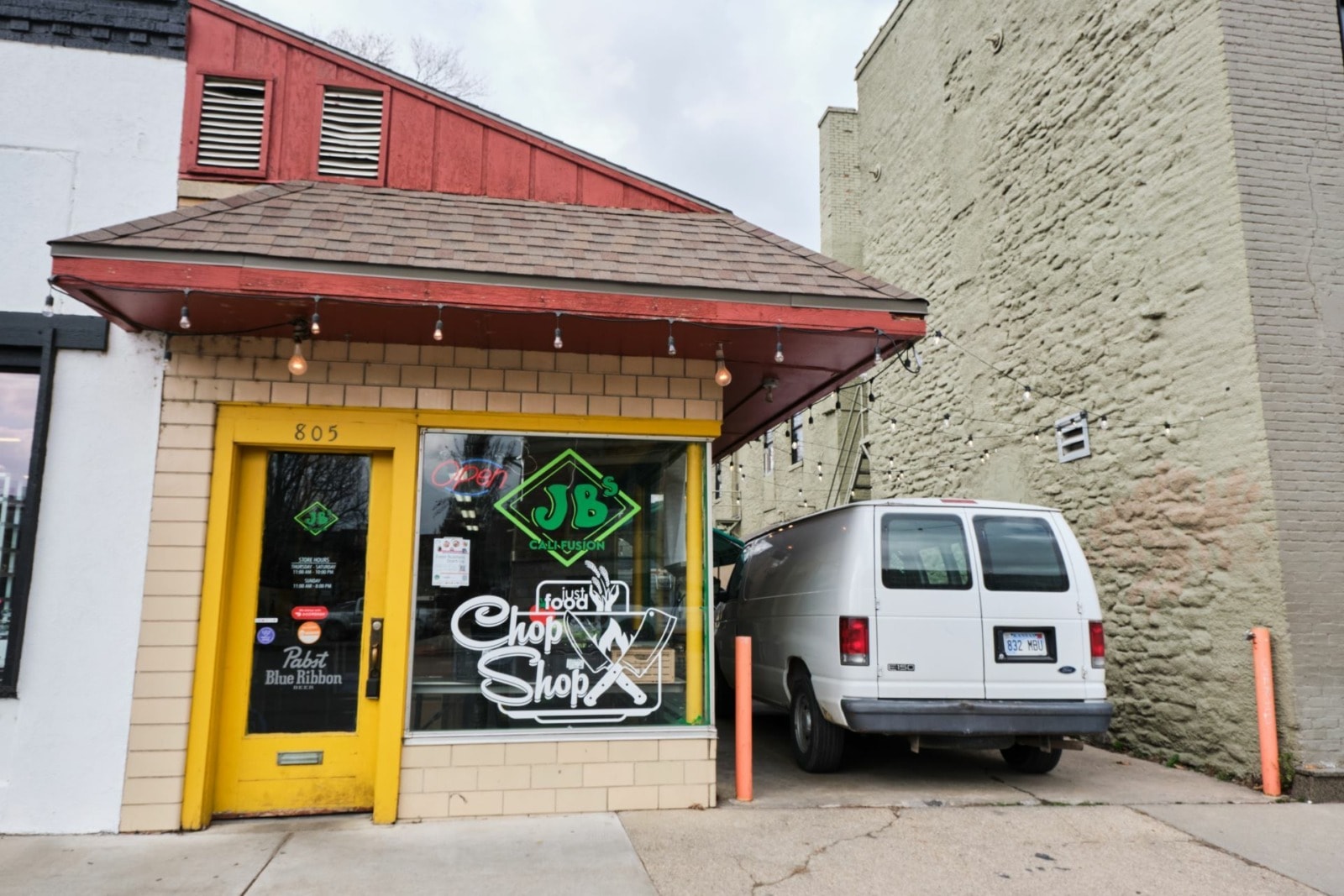
“Just having a static four walls with everything that we need for production is huge,” Michie says. “What we were finding a lot of the time when we were renting out spaces, there was no ability for us to store things, including equipment. So, it was literally me loading up a van with everything down to steel wool and towels and tongs, etc., etc. — as well as the product that I was going to cook that day — and trucking that in, trucking it back out. Now because we have the space, it increases my efficiency tenfold.”
The proof’s in the output.
Michie reports that in 2022, the year the Chop Shop opened, he and his team were able to turn 15,550 pounds of saved food into 20,100 pounds of prepared items. In 2023 — the Chop Shop’s first full year — the team gleaned 29,540 pounds and turned that into 40,043 pounds of prepared food.
What is Saved, Gleaned or Rescued Food?
One big culprit driving food waste is our own expectation.
Think about what you select at the grocery store. When choosing apples, you seek out ones that are blemish free. Cuts of meat are expected to have a specific form or shape — sometimes even a manufactured one. There are myriad other examples. And, when grocery store offerings no longer meet the retail standard, the best-case scenario is these items end up in a food pantry. Worst case: They end up as animal feed or are trucked to the landfill.
Then, there’s the concept of “best by,” “use by” or “sell by” dates, which are not the same as an expiration date. According to public awareness advocacy group U.S. PIRG, “with the exception of baby formula, food dating is not required.” And it is not standardized.
But while our grocery store standards are arguably the leading problem, there are others. Our large-scale food growing, storage and transport systems are not efficient enough to deliver every produced item to every hungry person. Weather and labor challenges can impact crops in the field, storage can degrade food and transport can cause damage.
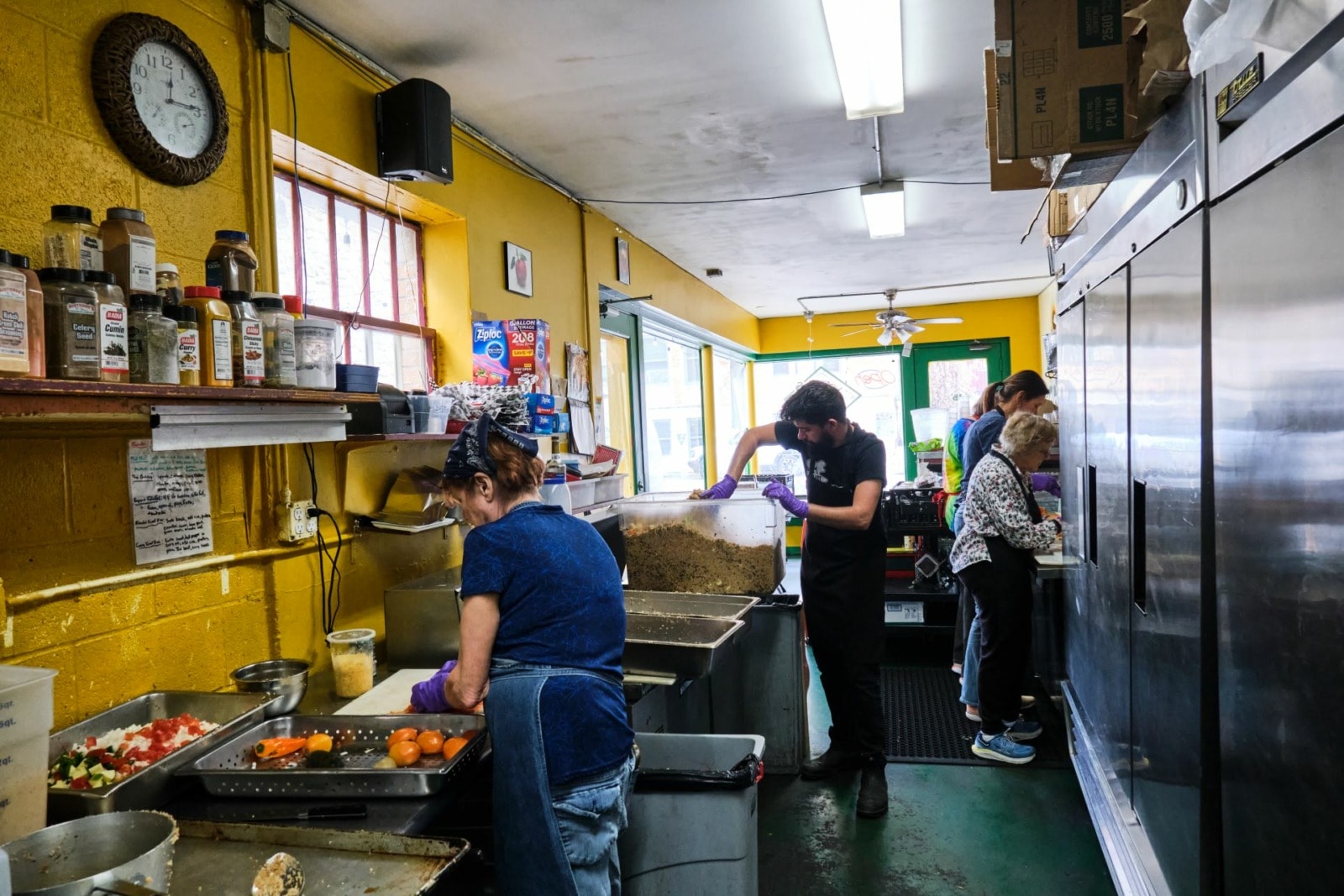
Could Kansas Be a Leader in the Food Insecurity Fight?
Meet Karla Hagemeister, executive director of Manhattan’s Flint Hills Breadbasket.
“So, the Breadbasket, we’ve done food recovery in the sense of picking up from grocery stores, that sort of stuff, since our inception for 40 years,” Hagemeister says.
And now, Hagemeister and allies in Manhattan are securing a permanent space to help convert recovered food into ready-to-eat solutions.
Flint Hills Breadbasket has allied itself with Flint Hills Food Recovery, an organization working as a liaison between the hungry and entities with food to donate. Another essential corner of this triangle is Common Table, a network of churches that for the past decade has served a hot meal nightly at various locations. The organization has in recent years added breakfasts to its offerings. Common Table is spearheading efforts to secure use of the kitchen in a centrally located and repurposed Manhattan school building.
“It was in 2018 that USD 383 put forward a bond election to remodel school buildings and reconfigure our high school. That made available the former junior high building, at 901 Poyntz Ave., that was going to be vacant,” says Common Table Board Chair Debbie Nuss.
According to Nuss, the cafeteria would have then gone unused. Seeing the merits of a centrally located, permanent space in which to cook and serve meals, Common Table approached the school district about using the kitchen. After years of discussions and community polling, 2024 is the year.
“We are on target to move into that space probably in early- to mid-fall of this year,” Nuss says. “It’s very confusing for the public to remember where to go on which night in terms of going to a meal. The convenience of having the meals all in one location, having it in a school, in a place that people are accustomed to going to, we’re feeling pretty excited and positive about that opportunity going forward.”
But excitement aside, Nuss says matter-of-factly there is a persistent and real need in the community, and she expects a jump in demand almost right away.
“It’s a capacity issue. On a percentage basis, we know what the demand is at the Breadbasket in terms of the number of people being served there,” Nuss says. “We know that our school district has a high percentage of children that are on free and reduced lunch. So, I think we’ll probably see an initial jump right away. I would expect even maybe a 20, 25% jump right off the bat.”
How does this shake out in terms of numbers served?
“Depending on the night of the week, probably on the low end is 60,” Nuss says. “But, on the high end, it could be 110. It depends on the night of the week, the weather and a lot of different factors.”
Averaging 85, that’s almost 600 individuals a week and almost 31,000 meals in a year. With the projected 20% increase that the fixed kitchen could spur, that annual number rises to over 37,000.
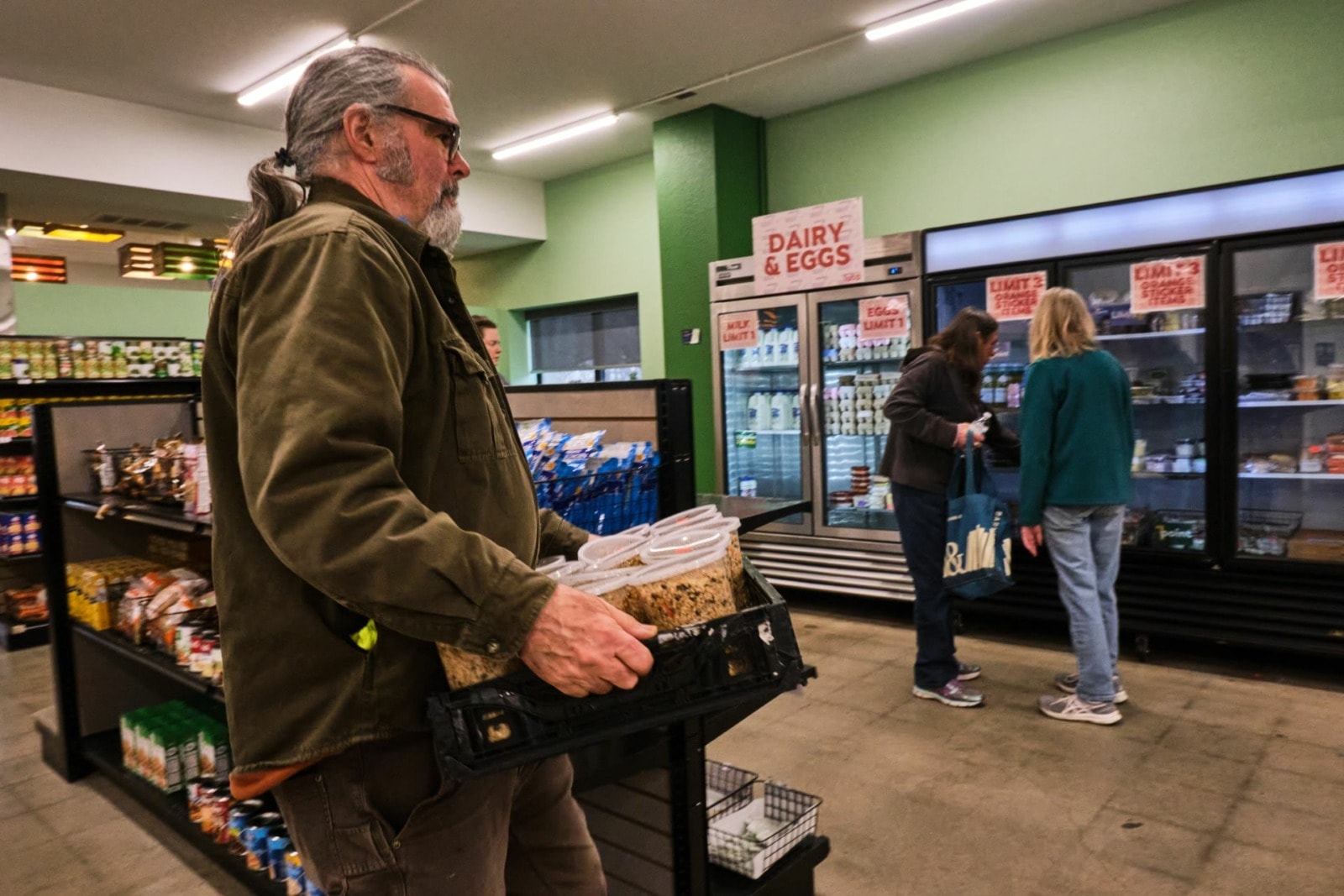
One begins to see the real scale of Manhattan’s need when adding the Breadbasket’s numbers.
“I’ve been at the Breadbasket for two years, and my focus has been scaling up just our onsite services. We went from serving probably 20 families a day to somewhere over 60 families a day,” Hagemeister says.
Asked why she chose to scale up, Hagemeister says she inherited a pantry with a fair amount of access restrictions — self-imposed barriers on income, job search status and such. But, she says, the community support was there — it was and is strong.
“We had a community that was giving food and willing to support us,” Hagemeister says. “Our general consensus is that people need to eat, and it’s not my place or our place to judge their circumstances. We also added a staff member who’s bilingual, which then expanded our services to the Spanish speaking population in our community.”
Lawrence Dishwasher Inspires a Food Insecurity Revolution
Matt Jozwiak came to culinary work as a means to an uncertain end.
After graduating from Shawnee Mission East High School, he attended the University of Kansas and built websites and washed dishes on the side. His dishwashing took him to Lawrence institution Java Break, where he washed dishes in the afternoon and evening and then, eventually, he would work doubles, baking overnight for the morning rush. But he had to sleep sometime, and he began missing class.
Eventually, he found his way to Lawrence restaurateur Robert Krause of Burger Stand fame. Over a glass of wine one night, Jozwiak said to Krause, “I want to be a chef.” Kraus’ reply, “No, you don’t.”
Finally, Krause gave in and said if Jozwiak wanted to learn the art of fine cuisine, he needed to make pilgrimages to Chicago or France or New York. So, off Jozwiak went.
After a long journey, Jozwiak is now executive director and founder of Rethink Food, a food rescue and feeding-the-hungry juggernaut. What led Jozwiak to this new adventure, he says, is the one thing stuck with him through all his years in the kitchen. The waste.
He worked in some of the world’s best kitchens, and he burned out. In a moment of introspection, a friend from the South Bronx reached out. The friend was working with a nonprofit there, teaching kids how to cook. So, Jozwiak went to New York, bar backed at night, and worked in the morning teaching kids how to cook.
But the food waste concern kept nagging at him.
“There’s all of these things that need to just be fixed,” Jozwiak says. “But everybody wants to do the thing that doesn’t really need to be done but makes them feel good. Me, I just wanted to figure out how to use excess food to make meals, to sell some of them so that the money comes back, and I can have the money to pay to give them away for free. So, I started down the path and started doing it in private cheffing, and it took on a life of its own.”
Rethink Food is, in reality, two separate nonprofits under one roof with multiple profit and loss statements.
First, Rethink Food goes to grocery stores and corporate cafeterias and asks them to both donate their food and pay for the cost of transport. Rethink also raises philanthropic dollars to cover the program’s overages. They then make meals using the donated food and give them away to between 80 and 90 community centers across New York.
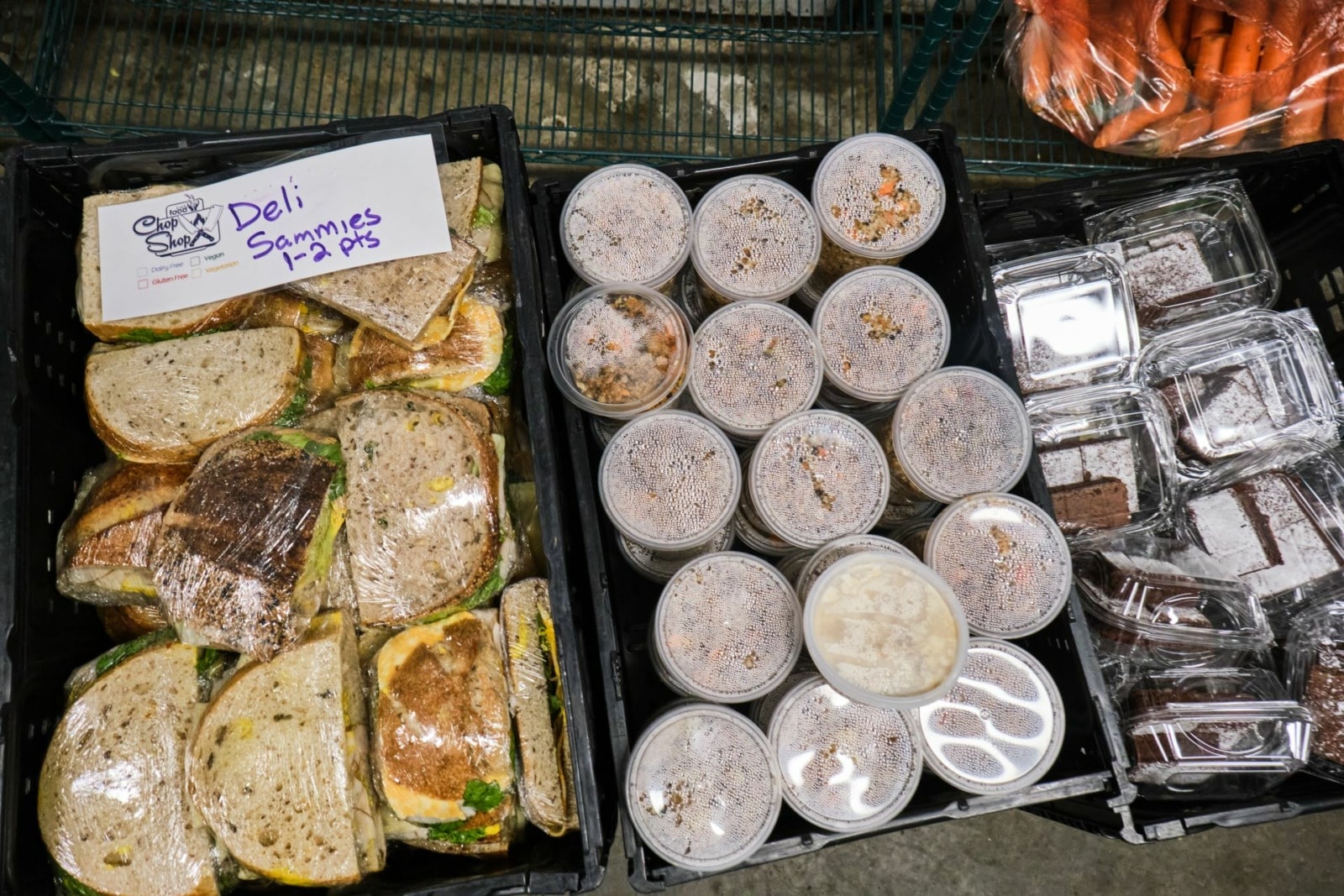
Additionally, Rethink Food gives away $6 million a year to small businesses in low-income neighborhoods to help them expand their operations and ensure food insecure people in these areas are served.
“Restaurants in South Bronx will automatically have been cooking for their local church for 20 years,” Jozwiak says. “It’s just what they do. And we’re like, ‘Can you do it on Monday and Wednesday as well? We’ll give you $5 a meal or $4 a meal.’ Then, we try to make it a little system where the church will throw their events and they’ll raise money out of their restaurant. They keep the money and build a system that never stops.”
Rethink Food is also in the government contract space. They bid on large, government food service contracts for shelters and similar organizations. But, where they innovate is they’ll “chop up the contracts into little pieces and let local restaurants get involved,” Jozwiak says.
“So, normally the homeless shelter down the street is government funded to make three meals a day, but they hire some catering company in Philadelphia to ship them frozen food that’s low-cost. So, we go to the restaurant, and we say, ‘We’re going to train you how to do this and help you hit that margin.’ And then we break apart the contracts for the government so that the money’s spent in New York and small businesses get a chance to thrive and hire people and all that good stuff.”
From Kansas to New York and Back
When Jozwiak was asked if he’s heard of anybody doing anything like what Just Food and Michie’s team is doing, his answer came fast.
“No, nobody does it.”
Then he paused for a moment, adding, “I don’t know why.” But then he had a realization.
“Actually, I do know why. I think that the nonprofit … it’s an industry, an industrial complex.”
“I see it everywhere I go,” Jozwiak says. “Round up your meal, donate a dollar, buy somebody a meal, click this button, all that kind of stuff. That money gets summed up, and then it goes to a foundation. A foundation takes 30% of it for their admin, then that goes to another nonprofit that takes 30% of it to make food. And it’s just insane, right?”
“So, I appreciate that. I’ve never heard of (Just Food’s) exact model, but I have heard of community groups renting kitchen space in the morning at restaurants.”
“Using their stuff and using their leftover food is exactly how it should be,” Jozwiak says. “Local businesses should employ people and help out.”
And, to bring it all full circle: Michie claims Manhattan, Kansas, as his hometown, and he cites Jozwiak as an inspiration.
“I looked (Matt) up when we were developing the framework for (the Chop Shop) program,” he says. “I was doing research to see if there was anything like this. And it turns out (Rethink Food is) basically the only one that I could find.”
Until now.
Flatland contributor Haines Eason is the owner of startup media agency Freelance Kansas. Flatland contributor Dominick Williams provided photos.



